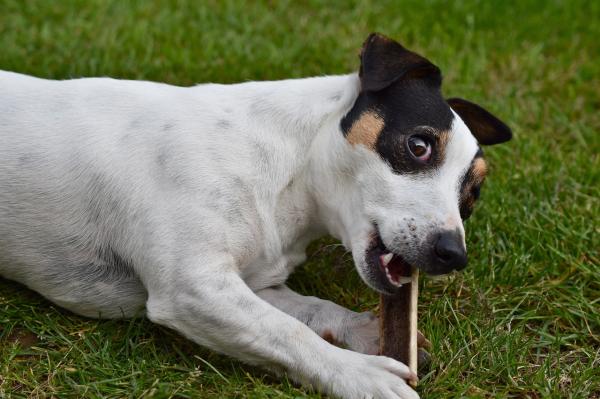Can Dogs Digest Bones? - Bones in a Dog's Stomach



See files for Dogs
Dogs can have serious trouble digesting bones. The idea of a dog chewing a bone is something which has been reinforced by popular culture, especially in cartoon depictions of dogs. Many pet stores and online retailers will still offer real animal bones for chewing. It is a practice which likely originated from the beginning of canine domestication. Previous human civilizations would feed their dogs with scraps from their own food, including bones of animals they have killed. However, giving bones to dogs also has certain risks. Digestion isn't easy and they can cause choking hazards or obstruction.
At AnimalWised, we learn more by answering the question can dogs digest bones? We look at what happens to bones is a dog's stomach and whether you should give bones to your dog at all.
Can dogs digest bones?
The question of digestion is not very straightforward. Bone is a calcified material which is very hard, making it difficult to be broken down in the digestive tract. This is why guardians give bones as a chew. With a large bone, the dog will slowly gnaw at the bone material and extract some nutrients such as calcium, magnesium and some amino acids. The amount will be relatively low, but the chewing can help the dog to feel satisfied.
Many producers of dog bones will use the ability to gain some nutrition as a selling point. However, dogs do not need bones as part of a balanced diet. Providing the best diet for a dog will require determining their specific needs according to various factors. These include their age, size and health status, among others. Bones provide only limited nutrition and are not necessary for their health.
Not all bones are suitable for a dog. One of the main determinants is whether the bone is cooked or raw. Cooked bones for dogs are more brittle because they have been dehydrated. When the dog chews them, they can become sharp. Not only can they cause a choking hazard, but the shards of bone can pierce internal tissues which can be life threatening for the dog. Dogs should never be given cooked bones.
Size is another issue. Large bones can be chewed for long periods and are not easy to fracture when raw. Small bones such a chicken bones or rib bones can be ingested whole and cause serious choking hazards. The size of the dog will also affect the size of the bone which is safe for them to chew. For example a bone which is safe for a Chihuahua to chew can be swallowed whole by a Great Dane.
What happens to bones in a dog's stomach?
Bones in a dog's stomach do not break down (digest) in the same way that food does. The digestive system of a dog is designed to handle bone matter differently. When dogs ingest small bone fragments from chewing on bones, these fragments typically move into the stomach.
In the stomach, bone fragments can be further broken down and softened by the acidic digestive juices. However, the stomach's acidic environment isn't always sufficient to fully digest bones. In many cases, smaller bone fragments will pass through the stomach and into the intestines, where they may continue to break down into smaller pieces.
Larger or harder bone fragments might not be fully broken down and can sometimes pose a risk if they don't pass through the digestive system smoothly. They can potentially cause gastrointestinal issues, including constipation, blockages, or even damage to the intestinal lining. Small dog constipation is a particularly worrying clinical picture.
It's important to note that the outcome can vary depending on the size and type of bone ingested, as well as the individual dog's digestive system. This is why it's essential to be cautious about the types of bones you offer to your dog and to monitor them while they're chewing bones to ensure their safety. If you suspect that your dog has swallowed a bone or is experiencing any issues related to bone consumption, consult your veterinarian for guidance and appropriate care.
Learn more about the digestive process in general with our guide on how long does it take for a dog to digest food?

What happens if my dog has swallowed a bone?
As mentioned throughout the article, the repercussions of giving your dog a bone can be catastrophic in some cases. If your dog is playing with a bone and you see fragments have broken off, you should remove it from them. Observe them for the next 24 hours to see any signs of it becoming lodged. You should give your dog an alternative such as a treat or a more suitable chew toy since they may be upset at the removal of the bone.
If a they have digested sharp fragments of bone, it is possible you will see blood in the dog's feces. However, the color and consistency of the blood will determine the nature of the problem. If a sharp piece of bone damages tissue further up the gastrointestinal tract, the blood will be dark and partially digested. Fresh blood means the injury is closer to the rectum.
In addition to blood in the dog's stool, you may see the following injuries caused by bones:
- Damage to the oral cavity, which can cause fistulas and even broken teeth.
- Obstructions at the level of the larynx with respiratory compromise.
- At the level of the esophagus, irritation of the mucosa that can lead to obstructions or ruptures of the esophagus.
- The same occurs at the level of the stomach and intestine, the consequences of which can be obstructions, ruptures, peritonitis and death in the worst cases.
- Irritation and fistulas in the rectum and anus.
It is very important to identify the symptoms of an obstruction caused by a bone or any other object. Take a look at our article on intestinal blockage in dogs to learn more.
How to help dogs pass bones
When it comes to helping a dog with a bone-related issue, the first and most crucial step is to contact your veterinarian. Attempting to resolve the problem manually can worsen the situation. Depending on where the bone is causing the obstruction, different approaches may be taken.
If the bone is stuck in the upper airways, such as the larynx, a veterinarian can use forceps or endoscopy to safely remove it. If the blockage is in the intestines, less invasive methods are tried first. These can include warm water enemas, which can be combined with a chlorhexidine shampoo. In some cases, adding a laxative based on sodium sulfosuccinate may help relieve the obstruction. If these initial approaches don't work or if the dog displays severe symptoms, a surgical procedure known as enterotomy might be considered.
In summary, if you're wondering how to assist a dog that has swallowed a bone, it's essential to seek professional veterinary care promptly. While the issue may not seem too concerning at first, untreated obstructions can lead to severe consequences, including peritonitis, and in some cases, even death.
Learn more about what to do if a dog have something stuck in their throat.
Safe alternatives to bones for dogs
For dog owners who want to provide recreational options without the risks of bones, there are several safe alternatives available. Many pet food companies offer treats, rewards or natural snacks made from highly digestible materials. For example, dehydrated chicken strips and other natural dog snacks are excellent choices. These alternatives allow dogs to chew and gnaw without the dangers associated with bones.
To find suitable alternatives, you can consult your local pet store or your veterinarian, who can recommend high-quality options. Additionally, you can explore online platforms like Amazon to discover a variety of safe and entertaining options, such as food dispensers and interactive toys, to keep your dog engaged.
Use the link below to see a good alternative to bones for your dog:

Should I give my dog a bone to chew?
Considering the risks associated with feeding bones to dogs, especially cooked or small bones that can splinter and cause obstructions or injuries, it's generally not recommended to provide bones for chewing. The potential health hazards outweigh the benefits, as bones can lead to serious digestive problems, choking, dental damage, or even surgical emergencies. If you want to satisfy your dog's need to chew and provide entertainment, it's safer to opt for alternative, dog-friendly toys, treats, or snacks designed to promote dental health and keep your pet engaged. Always consult with your veterinarian for advice tailored to your dog's specific needs and health status.
If you want to read similar articles to Can Dogs Digest Bones? - Bones in a Dog's Stomach, we recommend you visit our Diet problems category.







